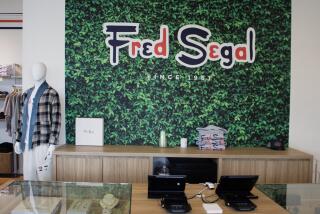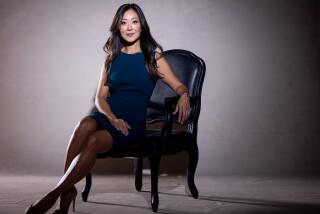HOW I MADE IT — Do Won Chang
- Share via
The gig: As founder and chief executive of Forever 21 Inc., Do Won “Don” Chang oversees one of the world’s fastest-growing fashion retailers, with 457 stores in 15 countries. From his office near downtown Los Angeles, he oversees an army of more than 20,000 employees ringing up sales of the season’s trendiest designs from Chiba (Japan) to Chico (Calif.).
Chock full o’clothes: Growing up in South Korea, Chang worked in coffee shops. So when he emigrated to California in 1981 at age 18, he figured hot joe would be his ticket to the American dream. Flashy Mercedes-Benzes and BMWs changed his mind. “I noticed the people who drove the nicest cars were all in the garment business,” Chang said.
Humble to huge: Chang opened his first store in L.A.’s Highland Park neighborhood in 1984, calling it Fashion 21. As sales took off and the clientele grew beyond the Korean American community, he changed the name to Forever 21. Other stores soon followed in the U.S. and overseas, including one in the Seoul neighborhood of Myung-Dong, where Chang grew up.
More growth ahead: The economic downturn forced Chang to make some cuts. The company ended 2009 with seven fewer stores than the year before. Still, revenue is climbing. In the last fiscal year, Forever 21 posted $1.7 billion in sales. It projects revenue of $2.3 billion this year. Much of that is from aggressive expansion — Chang is eyeing Israel and Hong Kong, for example. Equally important is a broad lineup. In addition to Forever 21, the chain has seven other formats, each serving distinct breeds of mall rats, including XXI Forever, which focuses on higher end couture lines, and Heritage 1981, featuring vintage-styled clothes.
A family affair: Chang opened his first store with his wife, Jin Sook, and has run the privately held company as a family business ever since. Daughter Linda heads marketing. His other daughter, Esther, is in charge of visual elements of the chain, such as graphics and window displays. “It’s important my daughters learn from the hard work my wife and I put into this company,” said Chang, who said a stock offering isn’t likely any time soon. “Who better to look out for your best interests than family?”
Cliché, but still warms the cockles: Chang is proud to have added his chapter to an American classic: the immigrant success story. “Forever 21 gives hope and inspiration to people who come here with almost nothing,” said Chang, who lives in a $16.5-million home in Beverly Hills and never went to college. “And that is a reward that humbles me: the fact that immigrants coming to America, much like I did, can come into a Forever 21 and know that all of this was started by a simple Korean immigrant with a dream.”
Staying power: Making it big in the shmatte business isn’t easy. Chang tells young would-be entrepreneurs that they need perseverance, and they better know their stuff. “You can’t go into business thinking that success will come to you in just one or two years,” said Chang, who insists that a deep understanding of business and legal culture was key to his success. Retail, he said, “is like a marathon, not a 100-meter dash.”
What it’s all for: A religious man, Chang dedicates much of his free time to spiritual pursuits. He and his wife run the Chang 21 Foundation, which donates money to churches and other faith groups. He travels to perform missionary work and cites the Bible as his favorite book. For Chang, stylish tops, skinny jeans and cut-rate accessories are just tools to help him “travel to places in Third World countries that desperately need aid.” Every Forever 21 shopping bag has a citation for a Bible verse printed on the bottom.
Just for fun: Chang occasionally plays racquetball or unwinds in front of the TV, watching his beloved Lakers. How focused is Chang? He hasn’t uploaded a single app to his smart phone.
Speed counts: Success didn’t come without struggle. Chang’s company has been accused of copying high-end designer garments and sued several times over copyright issues (the matters were settled out of court). But Chang says that the biggest challenge is the sheer speed of change. “Everyone wants something different, and they want it immediately,” he said. “You have to be very fast because other retailers are right behind you.”
More to Read
Inside the business of entertainment
The Wide Shot brings you news, analysis and insights on everything from streaming wars to production — and what it all means for the future.
You may occasionally receive promotional content from the Los Angeles Times.










